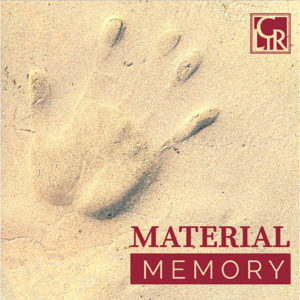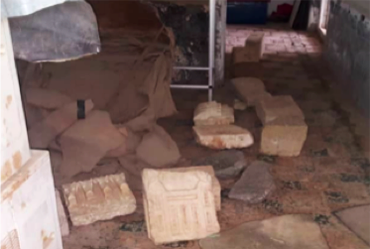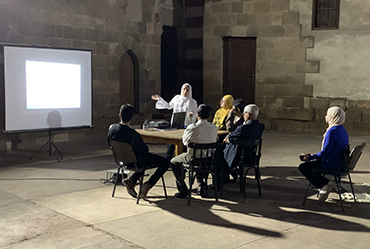
Number 132 November/December 2019
ISSN 1944-7639 (online version)
Contents
Edward Ayers, Fenella France Join CLIR Board
Digital Library of the Middle East’s Conflict Zone Emergency Intervention
DLF Fellows Reflect on 2019 Forum
Apply Now for CLIR Postdoctoral Fellowships
Leading Change Institute 2020 Accepting Applications
Reminder: Recordings at Risk Applications Due January 31, 2020
CLIR Issues is produced in electronic format only. To receive the newsletter, please sign up at https://www.clir.org/pubs/issues/signup. Content is not copyrighted and can be freely distributed.
Follow us on Twitter @CLIRNews, @CLIRHC, @CLIRRaR @CLIRDLF
Like us on Facebook @CLIRNews
CLIR Launches Podcast!
Tune in on Tuesday, December 10, as CLIR launches Season One of its new podcast, “Material Memory.”
In theme-based seasons, Material Memory explores the effects of our changing environment—from digital technologies to the climate crisis—on our ability to access the record of our shared humanity, and the critical role that libraries, archives, museums, and other public institutions play in keeping cultural memory alive.
 A pre-launch episode, “What’s at Stake,” introduces the podcast in a conversation with CLIR President Charles Henry about the threats to our cultural record, what is at stake if it’s lost, and what can be done to protect it.
A pre-launch episode, “What’s at Stake,” introduces the podcast in a conversation with CLIR President Charles Henry about the threats to our cultural record, what is at stake if it’s lost, and what can be done to protect it.
In an accompanying blog, historian and author Abby Smith Rumsey reflects on the question of why should we care about the persistence of collective memory. “Problem-solving requires access to trustworthy facts and vast reservoirs of imagination and patience. It is our imagination, seated deeply within the repertoire of knowledge that cultures carry, that generates possible futures,” she writes.
Season One celebrates the UN-designated Year of Indigenous Languages. In each of six episodes, host Joy Banks speaks with people involved in the work of restoring audio and audiovisual recordings of indigenous languages and their sometimes Herculean efforts to make these recordings accessible to the communities they represent. Watch the Season One trailer.
Season Two, to be released in spring 2020, will explore the wicked problem of ensuring that born-digital material remains accessible for future generations. Season Three, to be released in summer 2020, will look at the many ways in which the climate crisis is posing new risks to the survival of our human record.
Material Memory is available wherever you get your podcasts. We invite you to subscribe, rate, and review!
You can also visit our podcast website, material-memory.clir.org, for show notes, links to relevant material, interviewee bios, and a full transcript of each episode.
Edward Ayers, Fenella France Join CLIR Board
At its fall meeting, the CLIR Board elected new members Edward Ayers, Tucker-Boatwright Professor of the Humanities and president emeritus at the University of Richmond; and Fenella France, chief of the Preservation Research and Testing Division at the Library of Congress.
 Ayers has been named National Professor of the Year, received the National Humanities Medal from President Obama at the White House, was a finalist for the National Book Award and the Pulitzer Prize, and won the Bancroft Prize for distinguished writing in American history. He is a cohost for BackStory, a popular podcast about American history. His newest book, The Thin Light of Freedom: The Civil War and Emancipation in the Heart of America, has received the Lincoln Prize from the Gilder Lehrman Institute and Gettysburg College.
Ayers has been named National Professor of the Year, received the National Humanities Medal from President Obama at the White House, was a finalist for the National Book Award and the Pulitzer Prize, and won the Bancroft Prize for distinguished writing in American history. He is a cohost for BackStory, a popular podcast about American history. His newest book, The Thin Light of Freedom: The Civil War and Emancipation in the Heart of America, has received the Lincoln Prize from the Gilder Lehrman Institute and Gettysburg College.
 France is responsible for researching non-destructive imaging techniques and preventing environmental degradation of collections at the Library of Congress. Her current focus is advancing the field of spectral imaging and image processing techniques, and increasing links and access between scientific and scholarly data, including developing and providing training workshops for preservation professionals. She has led the creation of an international web-accessible research database infrastructure to make unique collection information available through visualization of the linked scholarly and scientific data. Since 2016, France has also been a CLIR Distinguished Presidential Fellow.
France is responsible for researching non-destructive imaging techniques and preventing environmental degradation of collections at the Library of Congress. Her current focus is advancing the field of spectral imaging and image processing techniques, and increasing links and access between scientific and scholarly data, including developing and providing training workshops for preservation professionals. She has led the creation of an international web-accessible research database infrastructure to make unique collection information available through visualization of the linked scholarly and scientific data. Since 2016, France has also been a CLIR Distinguished Presidential Fellow.
“We are delighted to welcome these distinguished individuals to CLIR’s Board,” said Chairman Christopher Celenza. “Both are pioneers in their fields and bring exceptional talent and experience to our work.”
“Fenella France’s work as a CLIR Distinguished Presidential Fellow has enlightened us to the groundbreaking methodologies that she brings to the preservation of our cultural heritage, both as a scientist and as a humanist dedicated to the broadest accessibility of our complex legacy,” said CLIR President Charles Henry. “Ed Ayers’ work with CLIR over the years, especially in areas pertaining to new forms of scholarly expression and publishing, is driven by a profound respect for the tradition of humanistic inquiry infused with rare insight into the opportunities offered by digital technologies in service to higher education and the public good. We are privileged to welcome these new Board members who so ably personify CLIR’s mission.”
Digital Library of the Middle East’s Conflict Zone Emergency Intervention
—Peter Herdrich
For the Digital Library of the Middle East (DLME), work with collections in conflict zones is a mission priority. Now, we are beginning an emergency intervention in a country at civil war. The ALIPH Foundation of Geneva, Switzerland, has given the DLME an emergency grant for work with the National Museum of Aden in the war-riven country of Yemen. Working with the director and staff of the museum and partners at the Egyptian Heritage Rescue Fund (EHRF), we will produce an emergency inventory and documentation of the collections and an assessment of storage at the museum.
Recent years have provided staggering examples of how people can contrive to endanger cultural heritage during conflict, and—lest we forget—endanger local communities and our colleagues who look after this irreplaceable patrimony. Consider the country of Yemen.
In 2015, civil war broke out in Yemen between the internationally recognized government and the Houthi rebels. It has been a bitter struggle that sparked what the United Nations now calls the worst humanitarian crisis in the world today. The human toll on the people of Yemen is staggering. There is a lack of food, medicine, and clean water, and 1.3 million Yemenis have contracted cholera. All this has occurred in the fifth poorest country in the world, where GDP per capita is estimated at $913 for 2019. With these humanitarian concerns, there are few resources for the cultural heritage sector.
Yet Yemen is culturally and archaeologically rich. The old city of the capital of Sana’a is inscribed on the UNESCO list of World Heritage Sites, along with other Yemeni sites. During the ongoing civil war, Sana’a has been the site of bombings and destruction of historic buildings. The threat to the cultural heritage of Yemen is serious and of national and growing international concern.
Against this backdrop, I met earlier this year with Yemen’s Minister of Culture, Marwan Dammaj, to talk about partnership with the DLME. He suggested, and we readily agreed, to work at the National Museum of Aden (NMA), collaborating on an inventory, cataloging, documentation, and digitization of their at-risk collection.

Aden is a conflict zone and the NMA is under threat. In fact, it has already been attacked, with Houthi rebels looting the entire coin collection. These coins are unlikely ever to return to their home at the museum. After the attack on the museum, material was moved from display to more secure areas and would benefit greatly from reorganization and repacking. The museum is now closed for security’s sake.
Over the summer, the DLME began working on these issues with Museum Director Mohammed Al-Saqqaf. We created a multiyear plan to address collection security and building issues and brought it to the ALIPH Foundation, a new funder that focuses specifically on cultural heritage preservation in conflict zones. And then in August, war broke out in Aden again.

Fearing the impact of the renewed fighting, we submitted an accelerated emergency intervention plan. We proposed that after training, the museum staff in Aden, under the direction of Mr. Al-Saqqaf, would inventory, describe, and photographically document all museum materials. They would regroup objects and report on how much risk the collections faced in current storage facilities. Then working with our international team from the Egyptian Heritage Rescue Fund, we would perform a risk assessment to determine if the collection needed to be moved.
In early October, CLIR received the emergency grant from the ALIPH Foundation. Two weeks later, museum leaders from Aden and DLME experts did the first training at the EHRF in Cairo.
The DLME and the EHRF hosted Museum Director Al-Saqqaf and Ahmad Bataya of the General Organization of Antiquities and Museums of the Republic of Yemen at the EHRF’s headquarters at the Bayt Al Razzaz, a Mamluk-era palace, in Historic Cairo on October 24 and 25.

The DLME provided photographic and documentation equipment to the NMA representatives, who received emergency intervention training in photography, collections storage and reorganization, and risk assessment, designed by EHRF Director Abdelhamid Salah.
Next steps for the project include online training for Director Al-Saqqaf’s team in Aden, made up of museum employees who know the collections best. Once trained, they will work in museum storage facilities to inventory and photograph collection materials, create and manage collection data and conduct the risk assessment. We plan to finish the project early next year.
The emergency intervention at the National Museum of Aden requires flexibility and persistence, and all of our colleagues are rising to the brisk pace. However, what is required of us is far less than the perseverance demonstrated by the brave team at the National Museum of Aden, within the combat area. For the DLME, conflict zone intervention is mission-fulfillment work. We are honored to be in service to the National Museum of Aden, the people of Yemen, and to all of us who care about our commitment to preserving and protecting the world’s cultural heritage.
Peter Herdrich is the project director of the Digital Library of the Middle East (@DigiLibraryME) a program of CLIR. He is also co-founder of the Antiquities Coalition and CEO of the Cultural Capital Group, LLC. pherdrich@culturalcapital.net.
DLF Fellows Reflect on 2019 Forum
The warm days of this fall’s Forum in Tampa may seem like a distant memory, but DLF Fellows are keeping the experience present by sharing their reflections in a series of blog posts at https://www.diglib.org/news/. Eighteen individuals received grants for travel, registration, and tuition this fall, with the goal of facilitating communication between all groups interested in the future of information, including museums, libraries, colleges and universities, and anyone working in digital collections and services.
The 2020 DLF Forum will be held in Baltimore November 9–11, preceded by Learn@DLF on November 8, and followed by NDSA Digital Preservation on November 11–12.
Apply Now for CLIR Postdoctoral Fellowships
CLIR is offering postdoctoral fellowships for 2020-2022 in data curation for African American and African Studies, data curation for energy social science, and scholarly communication.
Recent PhDs with expertise in any aspect of African American and/or African Studies are encouraged to apply for Postdoctoral Fellowships in Data Curation for African American and African Studies. Fellows will be placed at Fisk University, Grinnell College, University of Maryland, Philadelphia Museum of Art, and Rice University. Funded by The Andrew W. Mellon Foundation, these fellowships entail work that transcends the interests of single institutions and cultivates and strengthens inter-institutional partnerships in data curation.
Through a new grant from the Alfred P. Sloan Foundation, CLIR is offering three Postdoctoral Fellowships in Data Curation for Energy Social Science. These fellowships, which are for recent PhDs with disciplinary expertise that can help advance data curation practices and services in energy social science, are based at Carnegie Mellon University, the Massachusetts Institute of Technology, and the University of Michigan.
We are also recruiting recent PhDs for a CLIR Scholarly Communication Postdoctoral Fellowship at The Chinese University of Hong Kong. Eligible applicants do not need to be legally permitted to work in Hong Kong at the time of application.
Want to learn more? Join us over the next month for focused Twitter #CLIRPostdoc chats with CLIR Program Officer and former postdoc Jodi Reeves Eyre (@thejodireeves):
Dec. 4, 12-4 pm ET: Program benefits
Dec. 18, 12-1 pm ET: The application process
Jan. 8, 12-1 pm ET: The hiring process
The application deadline is January 10, 2020.
Leading Change Institute 2020 Accepting Applications
The application period is open for the 2020 Leading Change Institute, to be held in Washington, DC, May 31–June 5. Cosponsored by CLIR and EDUCAUSE, the week-long residential program brings together librarians, information technologists, and digital professionals in areas such as marketing, communication and enrollment management who seek to further develop their skills for the benefit of higher education. Participants learn how to create a collaborative community that leads on critical issues, develop the skills to advocate for needed change, and engage with real-world issues.
Joanne Kossuth and Elliott Shore will continue to serve as deans of the 2020 Institute.
Speakers for LCI 2020 will include:
- Peggy Agouris, Provost, William & Mary
- Jerry Berenson, former chief administrative officer, Bryn Mawr College
- Michael Cato, senior vice president and chief information officer, Bowdoin College
- Loretta Early, chief information officer, George Washington University
- Robert Ferrara, treasurer, MIT Hillel Foundation
- Charles Henry, president, Council on Library and Information Resources
- Monica Inzer, vice president for enrollment management, Hamilton College
- Judy Miner, chancellor, Foothill-De Anza Community College District
- Charles Nolan, regional representative (dean of admission, retired), Olin College of Engineering
- John O’Brien, president and CEO, EDUCAUSE
- Katherine Rowe, president, William & Mary
- Celeste Schwartz, vice president for information technology and chief digital officer, Montgomery County Community College
- Kevin Wood, research scientist, National Oceanic and Atmospheric Administration, Pacific Marine Environmental Laboratory
Participants from CLIR sponsor institutions selected to attend LCI are automatically eligible for a $500 discount. In addition, thanks to generous individual donations, CLIR is offering the Patricia M. Battin Memorial Scholarship, which provides $3,000 in tuition assistance to an individual whose institution cannot provide funding to support their attendance. Individuals may also apply for the EDUCAUSE Jane N. Ryland Fellowship to support their attendance at the Institute.
Applications for the 2020 Leading Change Institute are due by January 17, 2020. For more information on scholarships and to apply to LCI, visit https://leadingchangeinstitute.org/apply/.
Reminder: Recordings at Risk Applications Due January 31, 2020
Recordings at Risk supports the preservation of rare and unique audio, audiovisual, and other time-based media of high scholarly value through digital reformatting. Awards range from $10,000 to $50,000 and cover costs of preservation reformatting for fragile and/or obsolete time-based media content by qualified external service providers. Learn more at https://www.clir.org/recordings-at-risk/.

